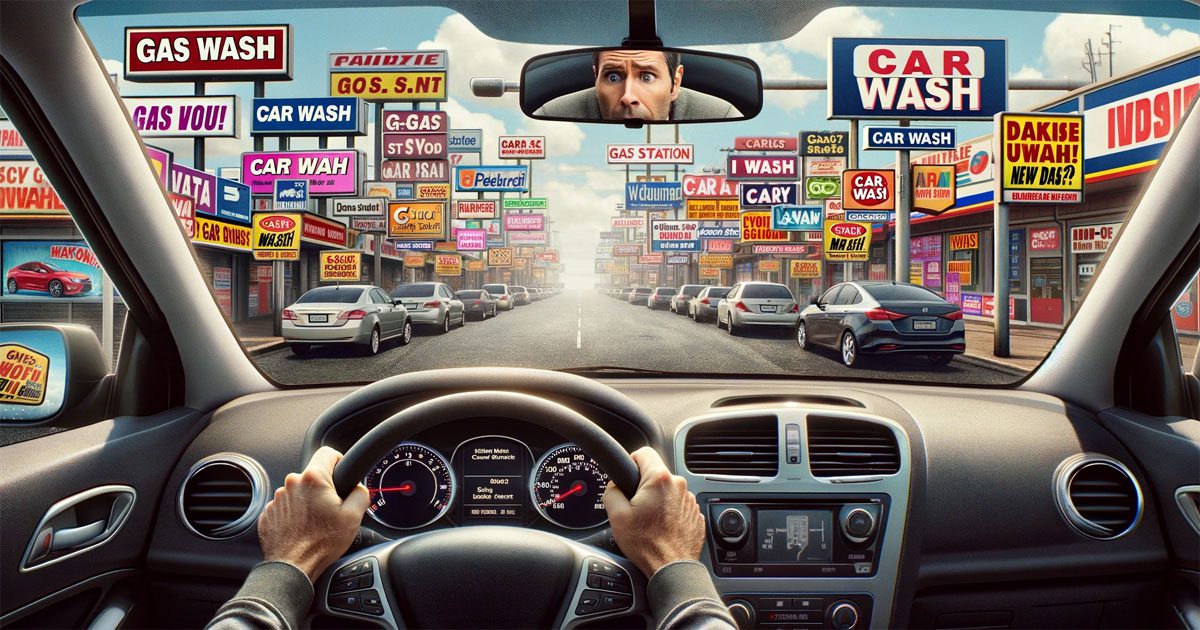On Sunday, I went to the family owned and run service station I've used for 17 years to get some petrol and to run my car through the car wash.
I told the attendant that I just finished my latest car wash loyalty card and will grab a new one with today's car wash, only to be told they've scrapped the loyalty card system.
It's hard to describe what happened that moment but it was like a god-sized pair of golden scissors cut what Leornard Cohen calls "the high silver nerve" connecting me to that business.
This article is me thinking out loud to describe what happened and what the likely consequences will be in the hope you'll find it helpful for your business.
The subconscious power of the loyalty card
I have a car wash habit. Every time I fill my car with petrol, I run it through the car wash; not the basic one, not the super supreme, just the premium one with the wax finish.
Yes, I know, price framing at its best. Set the basic price to be just a little bit too basic, the top price to be exorbitant with too many bells and whistles, while the middle option screams "this is the smart choice".
Back to car washing. This habit of mine might seem excessive to some but I figure, with my hybrid only needing fuel every 4-6 weeks it works well.
The loyalty card played a role in maintaining this habit because "every 6th car wash is free". Knowing that I "wasn't really paying full price" made it a no brainer to keep the car looking fresh.
Interestingly, this BP station is nextdoor to a Shell station run by Coles. The latter is in a much more convenient location. My beloved family business required doing a couple of extra manoeuvres to get to, which I have done with almost 100% commitment for more than a decade.
And this is where the power of a loyalty card lurks.
As I reflect on my habits since 2006, the subtle thought that I was "earning" my token discount with every purchase meant I didn't even give a second thought to going out of my way or ignoring the slightly cheaper price at the multinational service station.
Actually, that's not quite true. There have been times when the inconvenience was a pain, but I pushed through, all because that little dark blue card with stamps and signatures was sitting by my side exerting its strong but invisible pull on my thinking.
Then, on Sunday, that powerful force was turned off.
Pragmatism has a price
The reason given for ending the loyalty card system was delivered in a matter-of-fact, well-meaning way.
In short, the service station owners say that instead of passing on an increased price, they decided to remove the loyalty cards.
There is a pragmatism at work here. Firstly, we are all in on it. We all know that for us to get our 6th car wash free we must be paying a slightly higher price to cover the free one. Secondly, there was probably some annoyance in maintaining a stock of cards, the special stamps, and the occasional surprise when a card untouched for two years is brought back in to get its next stamp or claim its rewards.
What that fails to take into account, is this insidious, invisible bond, forging a habit of consumption all for the sake of a token discount.
Sunday's discovery was like my inner consumer being woken up by the attendant throwing a bucket of cold water in my face. What had I been doing? How did I sleep walk into this "slavery"?
Marketing knows why.
Loyalty cards in marketing theory
As Terry Lane succinctly summarises in The Customer Loyalty Theory at Chron, "loyalty marketing is a major segment of marketing theory and considered one of the value propositions that a marketer can offer a potential customer."
Whether it's frequent flyer points, gifts, cash back, or special access to special buys, when we are in "consumer mode" it seems we love them. Terry continues:
Members of loyalty programs are the best and most profitable customers for many businesses. Customers are often looking to fulfill two needs when shopping for a product. Of course, one need is to save money and get the best deal, which the Chief Marketer website describes as a hard benefit. The other is to feel important and receive special recognition, which is the soft benefit that some customers don’t always realise they want.
We also know, from other parts of marketing doctrine, that not all loyalty systems are equal. Getting your 10th coffee free if it's at a cafe you would go to any way, is just cream on the cake and stops you wandering. Whereas, shopper rewards cards load our retail giants with so much data about us we are actually helping them "screw us' ever more effectively in return for a few crumbs gathered up under their tables - or by the sides of the self-service checkouts we operate for them for free.
Does this mean my local BP is dead to me? No.
I still like supporting family businesses and will always strive to.
What happens now, though, is that I will be more realistic about what station is convenient for filling. I doubt I'll be going to the Shell, but it does mean I now feel free to "share the love" and might even fall in love with another place!
I guess you can say I'm now in an open marriage with my beloved BP.
This is just one of the topics we can discuss in our mentoring program, either through a direct Marketing Consultation, or one of the government-subsidised mentoring programs we deliver.
So, before cancelling or changing any loyalty programs, please be mindful that from our perspective, as consumers, if you're not in it for love, we're outta here.

